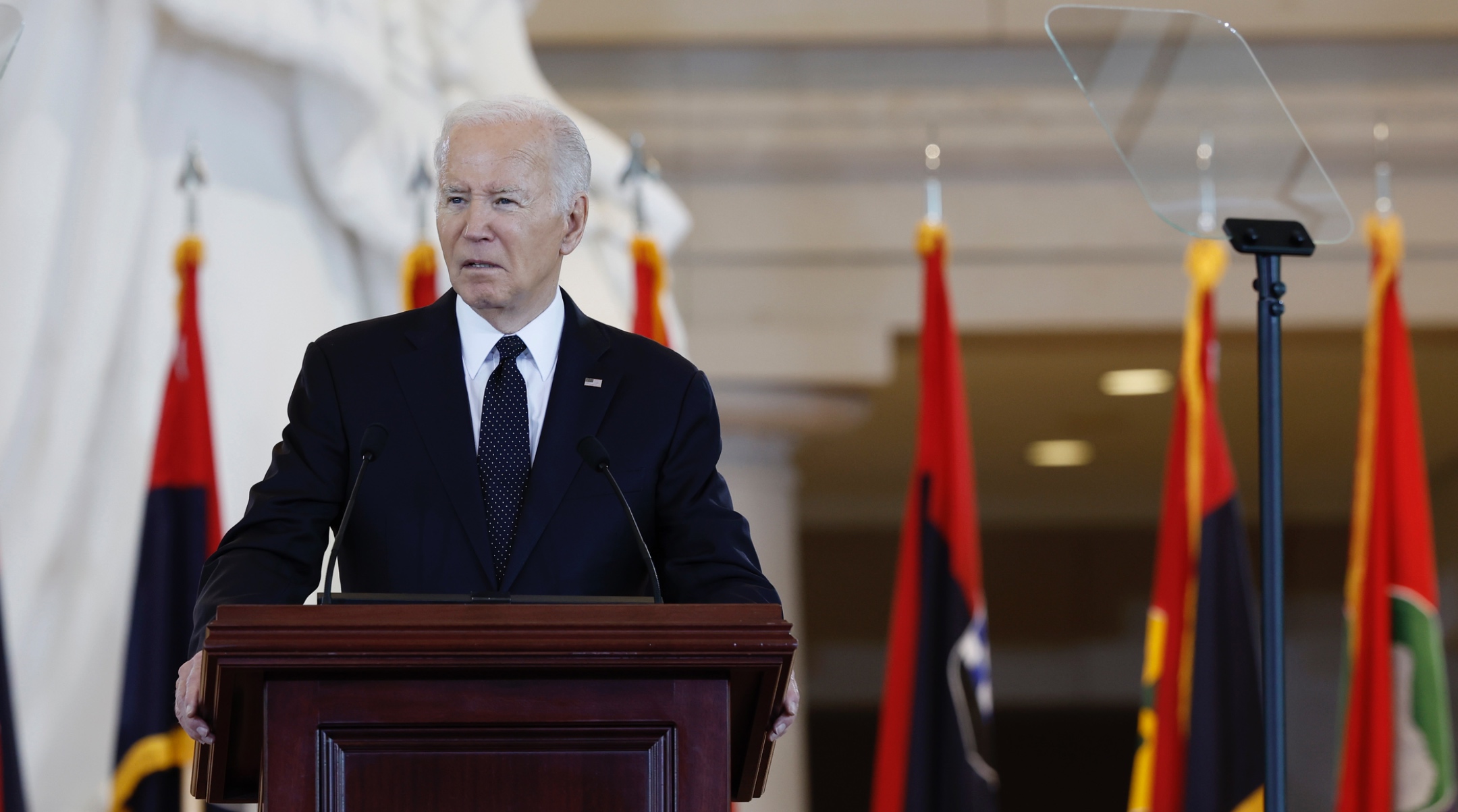‘You are not alone’: Biden in Holocaust remembrance speech vows to fight Oct. 7 denialism
Biden drew a direct line between Holocaust denial and the tendency by some to downplay or even deny the atrocities of Oct. 7

U.S. President Joe Biden speaks during the U.S. Holocaust Memorial Museum’s Annual Days of Remembrance ceremony at the U.S. Capitol, May 7, 2024. (Anna Moneymaker/Getty Images)
WASHINGTON (JTA) — President Joe Biden aimed straight at American Jewish anxieties of the moment in a speech commemorating the Holocaust, pledging to keep alive the memory of Hamas’s Oct. 7 massacres in the face of waves of anti-Israel and antisemitic actions.
“I see your fear, your hurt, your pain,” Biden said Tuesday at the annual commemoration at the U.S. Capitol, organized by the U.S. Holocaust Memorial Museum. “Let me reassure you as your president, you are not alone.” The audience of Holocaust survivors, Jewish lawmakers, students and Jewish officials applauded.
Biden’s pledge comes as Israel launches a major operation in Rafah targeting Hamas, whose terrorists launched the war on Oct. 7, and as public sentiment — especially among Democrats, long the political home of the Jewish community — turns against Israel over a war that has seen huge civilian casulaties.
“Here we are not 75 years later, but just seven and a half months later, people are already forgetting that Hamas unleashed this terror,” Biden said, flanked by the flags of the U.S. military units that liberated the Nazi death and concentration camps. “I have not forgotten and nor have you, and we will not forget.” The audience applauded again.
Biden drew a direct line between Holocaust denial, long entrenched as a facet of antisemitism, and the tendency by some to downplay or even deny the atrocities of Oct. 7.
“Too many people denying, downplaying, rationalizing, ignoring horrors of the Holocaust and October 7, including Hamas’s appalling use of sexual violence, torture and terrorizing,” he said. “It’s absolutely despicable and must stop.”
Biden, like virtually every other speaker, addressed the pro-Palestinian campus protests that have swept the nation, in some cases culminating in violence and police raids. As he did last week in a special statement, he said he would uphold free speech but drew the line at violence and hate speech.
“There’s no place on any campus in America, any place in America for antisemitism or hate speech or threats of violence of any kind,” he said.
Other speakers included House Speaker Mike Johnson, a Louisiana Republican; Minority Leader Hakeem Jeffries, a New York Democrat, and Abe Foxman, a survivor and the former national director off the Anti-Defamation League.
Johnson has been leading efforts by Republicans to tie the campus protests to the Biden administration, as well as link them to right-wing accusations of a liberal drift in academia. In his remarks, he compared the campus pro-Palestinian protests to the assault on Jewish students and academics before and during the Holocaust.
“We remember what happened then, and today, we are witnessing American universities quickly become hostile places for Jewish students and faculty,” said Johnson.
Biden’s speech comes a year after his administration launched a strategy to combat antisemitism. The White House before the speech listed new measures under the strategy that it would launch in coming days, including a letter from the Department of Education to schools and universities around the country outlining how expressions of antisemitism could launch investigations. Multiple investigations have been launched since Oct. 7.
Also listed were a planned guide for campus safety resources, and the development of best practices to prevent violence, both spearheaded by the Department of Homeland Security.
The State Department’s office of the special envoy to combat antisemitism, Deborah Lipstadt, would convene tech companies to discuss how best to deal with online antisemitic content, the White House said in its release.
This article originally appeared on JTA.org.
















